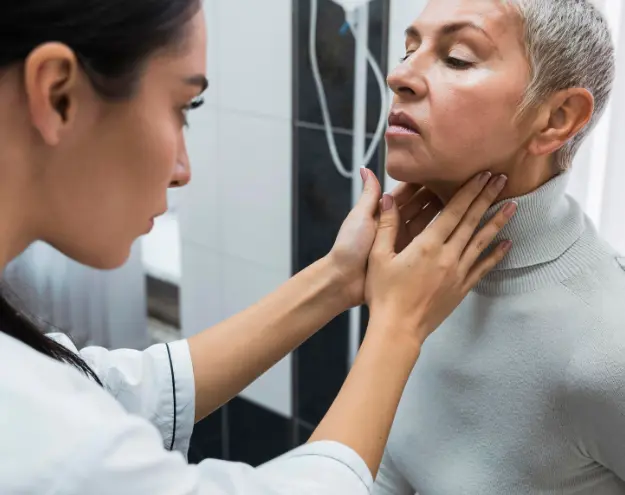Comprehensive Care for Head and Neck Cancer
Head and Neck Cancer in Chennai VS Hospitals delivers expert diagnosis, advanced treatments, skilled oncologists, and personalized care for improved recovery outcomes.

Head and neck cancer refers to a group of cancers that develop in the head and neck regions, including the mouth, throat, nose, sinuses, salivary glands, and larynx (voice box). These cancers are typically squamous cell carcinomas, meaning they originate in the thin, flat cells lining the surfaces of these areas. Early detection and treatment are essential for improving outcomes, as head and neck cancers can spread quickly if left untreated. With advanced treatment options and a multidisciplinary approach, the chances of recovery and survival have significantly improved.
In this article, we will explore the signs and symptoms, risk factors, diagnosis, and treatment options for head and neck cancer. We will also delve into the prevention and post-treatment care offered at VS Hospitals, a leading healthcare provider in Chennai.

Early Detection Saves Lives
Early detection and treatment are crucial for improving the chances of survival. If you notice any concerning symptoms, consult a healthcare provider immediately.
Signs and Symptoms
Lumps or Swelling
A lump or swelling in the neck, mouth, or throat that doesn’t go away is a common sign of head and neck cancer.
Sore Throat or Hoarseness
Persistent sore throat, voice changes, or hoarseness that lasts more than two weeks can be a symptom.
Difficulty Swallowing
People with head and neck cancer may have trouble swallowing food or liquids, or may experience pain while swallowing.
Persistent Cough
A chronic cough, particularly if accompanied by blood, may be a sign of cancer in the throat or lungs.
Ear Pain
Pain in the ear, especially on one side, can indicate cancer in the throat, larynx, or neck.
Unexplained Weight Loss
Unintentional weight loss may be a sign that cancer has spread or is affecting the body’s metabolism.
Nasal Problems
Blocked nasal passages, nosebleeds, or a persistent nasal discharge can be symptoms of cancer in the sinuses or nasal cavity.
Blood in Urine
Hematuria - pink, red, or dark urine, the most common symptom
Frequent Urination
Feeling the need to urinate frequently, even when bladder is not full
Painful Urination
Experiencing pain or burning sensation while urinating
Back or Pelvic Pain
Pain that occurs as the cancer grows and spreads
Unexplained Weight Loss
Significant weight loss not related to diet or exercise
Fatigue
Feeling unusually tired or weak without a clear cause
Meet Our Expert Head and Neck Cancer Oncologists
Risk Factors
Smoking
Smoking is one of the leading causes of bladder cancer. Chemicals in tobacco smoke can damage the lining of the bladder, increasing the risk.

Gender
Men are at a higher risk of developing bladder cancer than women.

Chronic Bladder Infections or Inflammation
Conditions such as bladder infections and long-term bladder inflammation can increase the risk.

Exposure to Chemicals
Prolonged exposure to certain chemicals, especially those used in the dye industry, rubber production, and chemical manufacturing, increases the risk.

Tobacco Use
Smoking or chewing tobacco is the primary risk factor for head and neck cancers, particularly cancers of the mouth, throat, and larynx.

Alcohol Consumption
Excessive alcohol use, especially when combined with tobacco use, significantly increases the risk of head and neck cancer.

Human Papillomavirus (HPV)
Certain strains of HPV, particularly HPV-16, are linked to cancers of the throat and tonsils.

Age
People over the age of 50 are at a higher risk of developing head and neck cancer, although younger individuals are also susceptible, particularly in the case of HPV-related cancers.

Gender
Men are more likely than women to develop head and neck cancer.

Sun Exposure
Prolonged exposure to sunlight can increase the risk of lip and skin cancers in the head and neck region.

Poor Oral Hygiene
Poor dental hygiene and untreated gum disease may increase the risk of cancers in the mouth.

Family History
A family history of cancer may increase the likelihood of developing head and neck cancers.

Diet
A poor diet lacking in fruits and vegetables may contribute to the development of cancer due to the lack of protective nutrients.

Advanced Cancer Treatment Options
Diet and Nutrition
Prevention
Diagnosis
Key Services
Key Facilities
Maintaining a healthy diet plays an important role in preventing head and neck cancer and improving overall well-being during treatment. Here are some dietary recommendations:
- Eat a Balanced Diet: A diet rich in fruits, vegetables, whole grains, and lean proteins can help boost the immune system and protect the body from cancer.
- Consume Antioxidants: Foods high in antioxidants, such as berries, citrus fruits, and leafy greens, can help fight inflammation and reduce oxidative stress.
- Limit Processed Foods: Reducing the intake of processed meats and foods high in sugar, salt, and fat can help lower the risk of cancer.
- Hydrate: Drinking plenty of water helps maintain hydration, particularly for individuals undergoing chemotherapy or radiation, which can lead to dehydration and mouth sores.
- Vitamin-Rich Foods: Foods rich in vitamins A, C, and E may have cancer-fighting properties. Examples include carrots, oranges, bell peppers, and nuts.
- Avoid Alcohol and Tobacco: Since tobacco and alcohol increase the risk of head and neck cancer, it’s crucial to limit or avoid their consumption.
- Consider Supplements: Speak with a doctor or nutritionist about incorporating supplements like vitamin D and selenium, which have been linked to cancer prevention.
A well-balanced diet is crucial for overall health and well-being, particularly for individuals recovering from or undergoing treatment for cancer.
While there is no guaranteed way to prevent head and neck cancer, certain lifestyle changes can significantly reduce the risk:
- Quit Smoking and Tobacco Use: The most important step in prevention is quitting smoking and avoiding all forms of tobacco. This can reduce the risk of various cancers, including head and neck cancer.
- Limit Alcohol Consumption: Drinking alcohol in moderation or avoiding it entirely can reduce the risk of developing cancer in the head and neck region.
- HPV Vaccination: The HPV vaccine, which protects against the strains of the virus most commonly linked to head and neck cancers, is recommended for both boys and girls in their early teens.
- Sun Protection: Using sunscreen on the lips and wearing protective clothing or hats can help protect against lip cancer caused by excessive sun exposure.
- Healthy Diet: A diet high in fruits and vegetables, along with regular physical activity, can help prevent cancer by strengthening the immune system.
- Regular Check-ups: Regular visits to a healthcare provider for dental check-ups and screenings for head and neck cancers can help detect any abnormalities early, improving treatment outcomes.
By adopting these preventive measures, individuals can lower their risk and increase their chances of maintaining good health.
Early diagnosis of head and neck cancer increases the chances of successful treatment. Here are the common methods used to diagnose the condition:
- Physical Exam: A healthcare provider will examine the head, neck, and mouth for any signs of lumps, swelling, or other abnormalities.
- Imaging Tests: X-rays, CT scans, MRIs, and PET scans are commonly used to get a detailed view of the affected areas and check if the cancer has spread.
- Biopsy: A biopsy involves removing a small sample of tissue from the suspected tumor to determine whether it is cancerous. This can be done via a fine needle or during a surgical procedure.
- Endoscopy: An endoscope (a flexible tube with a camera) is inserted through the nose or mouth to examine the throat, larynx, or sinuses for signs of cancer.
- Blood Tests: Certain blood tests may be used to evaluate a patient’s overall health and detect any abnormalities that could suggest cancer.
Diagnosis involves a comprehensive approach using multiple tests to confirm the presence of cancer and determine its stage.
VS Hospitals offers a range of specialized services to help diagnose and treat head and neck cancer, ensuring personalized care for each patient:
- Cancer Screening: Regular screenings to detect early signs of head and neck cancer, especially for high-risk individuals.
- Surgical Oncology: VS Hospitals provides expert surgical treatments, including the removal of tumors and affected lymph nodes.
- Radiotherapy: Advanced radiation therapy techniques are used to target and shrink tumors in the head and neck region.
- Chemotherapy: Chemotherapy is used to treat cancers that have spread or are inoperable, and VS Hospitals offers the latest chemotherapy protocols.
- Palliative Care: For advanced stages of cancer, palliative care is available to manage pain and improve quality of life.
- Rehabilitation: Speech therapy, physiotherapy, and psychological counseling are offered to help patients recover after treatment.
VS Hospitals is equipped with world-class facilities to ensure that head and neck cancer patients receive the best possible care:
- Advanced Diagnostic Imaging: State-of-the-art imaging equipment, including CT, MRI, and PET scans, ensures accurate diagnosis and staging.
- Dedicated Oncology Department: The oncology department at VS Hospitals is staffed with experienced specialists who work together to provide comprehensive cancer care.
- Surgical Suites: The hospital is equipped with the latest surgical technology to perform complex surgeries with precision and care.
- Comfortable Patient Rooms: Private and comfortable rooms provide a peaceful and supportive environment for cancer patients.
- Multidisciplinary Care: A team of experts from various fields, including surgeons, oncologists, speech therapists, and nutritionists, collaborate to provide holistic treatment.
Top Medical Facilities at Our Multispeciality Hospital – Here’s What Makes Us Different!
Ready to Begin Your Head and Neck cancer Care Journey?
Learn More About Head and Neck cancer
Frequently Asked Questions
Common symptoms include persistent sore throat, hoarseness, difficulty swallowing, lumps or swelling in the neck, ear pain, and unexplained weight loss. If these symptoms persist for more than two weeks, it is important to seek medical attention.
VS Hospitals offers a multidisciplinary approach to treatment, including surgery, chemotherapy, radiation therapy, and palliative care. The treatment plan is personalized to each patient based on the cancer’s type, location, and stage.
While head and neck cancer cannot always be prevented, reducing risk factors like quitting smoking, limiting alcohol consumption, getting the HPV vaccine, and maintaining a healthy diet can significantly lower the risk of developing cancer. Regular screenings are also essential for early detection.

